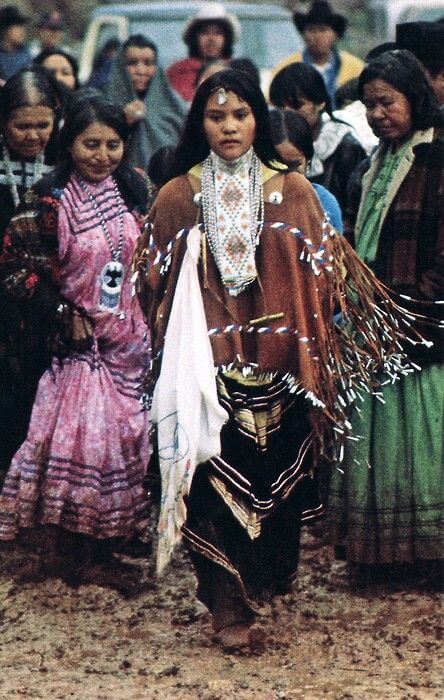Guest post by Sophia Style ©

Imagine you are an Apache girl. The day you start menstruating, you feel very proud and excited because you know that the whole village will celebrate with you. You go to your godmother’s hut with an eagle feather to give her the news. She will teach you everything you need to know in your transition to womanhood. First of all you go to a special lodge, where you spend some time alone and fast to cleanse your body and mind. When you’re ready, your godmother tells you that that now you are now fertile and can have your own children. She teaches you many things about menstruation, fertility, sexuality and female medicine rituals. While you’re learning, a special dress is made for you. Your godmother prepares you for your ceremony and teaches you a special dance to the four directions. Finally, there is a big celebration with all your community. You receive many gifts and blessings, and then as “giver of life”, you give your blessing to the tribe.
Now you are a girl in of the Aiary tribe in Brazil. When you announce the arrival of your first period, your family and your friends gather round you. Your mother symbolically cuts off your braids, representing your change of state, and everyone takes a hair to keep for good luck. For a month, until your next period, you only eat bread and fish, to purify your body and mind. The day after your second period, your father gets up at dawn to sing a special song, inviting everyone on your village to a feast where you can eat as much as you like!
We continue our journey, crossing the Atlantic Ocean, and you are a girl in Nigeria in the Tiv tribe. On the first day of your period, your community sees you as a giver of fertility, bringing good luck to your community. On this day, you walk across all the fields of the village, blessing the soil and helping to bring a bountiful harvest. During a ceremony in your honor, you receive a tattoo under your navel symbolizing fertility. From now on, proudly show it to everyone, now that you’re no longer a girl.
Now let’s cross the Indian Ocean to complete our trip in Sri Lanka. Here you take a special ritual bath on the day of your first moon. You leave your girlhood behind in the water and step out of the bath as a young woman. You are given a new white dress to wear, the color of initiation. Your family prepares a celebration in which you receive many gifts and blessings for a happy, healthy and prosperous life.
Let’s return to Western culture. Although we live in a completely different context, we can find many sources of inspiration and new ideas in these stories for this important rite of passage in a girl’s life. Some of these rituals are still practiced today, others have been lost. It would be easy to romanticize them, and we don’t know exactly how each girl experienced these events. But the truth is that in modern society girls are experiencing their menarche in a very different context. .
In different women’s circles, with women from Great Britain, Canada, United States, Spain and Latin America, we have shared the stories of our first blood and apart from one set of parents who opened a bottle of champagne in celebration, everyone around us responded with a mixture of shame, secrecy and triviality; the less you talk about it better, except to give you some sanitary pads. Most of us felt a great lack of information and a lack of recognition of the changes that were happening inside our bodies and emotions.
At the same time, we felt enthusiasm, curiosity, excitement, pride, confusion, fear, sadness and grief. All of us knew intuitively that something was dying – that somehow it was the end of childhood and a new and unknown world was opening before us.
In these times of transition, such as birth and death, human beings have always needed to recognize and honor these changes in a social setting with some kind of ritual.
In the case of our first menstruation, it is a rite of passage that in our society the majority of women have experienced in solitude, reflecting the centuries of shame and rejection around women’s menstrual blood.
At the same time, there is a strong desire among women all over the world to offer a different experience to the next generation of young women, helping them to feel more prepared and more supported. The value that is given to a girl’s first period is intimately related to the value give to womanhood. We will always carry the memory of this experience with us, and it has a deep effect on our self-esteem, our health and self-image. In spite of the negative messages that many young women still receive about their menstruation, let’s do what we can to ensure that girls feel appreciated and respected on this unique and special day of their lives.
Extract of an article written in Spanish by Sophia Style, based on the rituals explained by Anke Mai in her booklet “First Moon, Celebrating the Onset of Menstruation”.
http://mujerciclica.com/2013/03/04/primera-menstruacion/
______________________
Apache girl image found on: https://www.pinterest.com/pin/205758276697052700/


